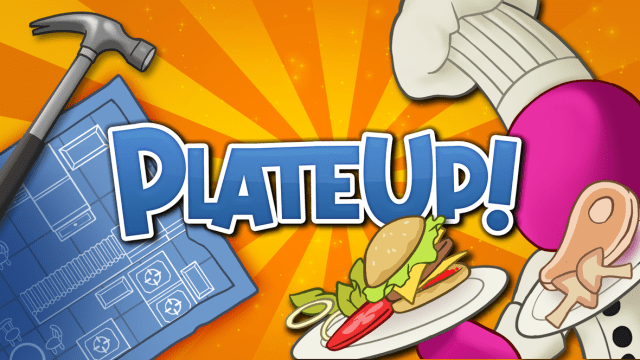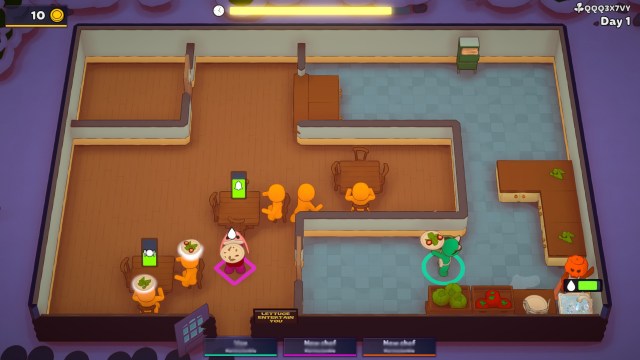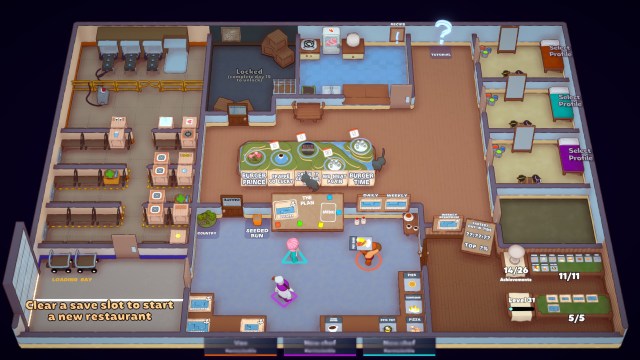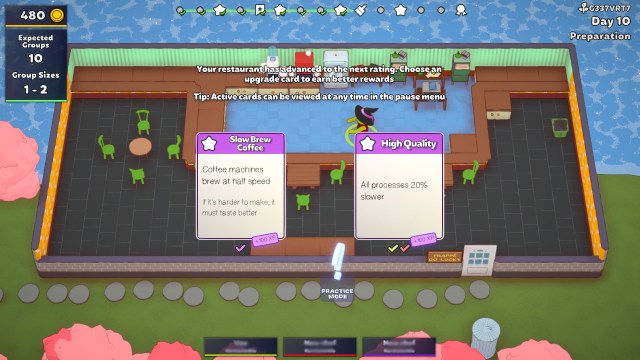PlateUp! was first dished up on PC back in 2022, but now it’s time for the teams at It’s Happening and Yogscast Games to bring their roguelike, cooperative cooking chaos to console. We grabbed for the apron and sat down with the original developer behind PlateUp!, Alastair Janse van Rensburg, in hope of discovering more about the upcoming Xbox launch.


Hi, could you please introduce yourself and your role on PlateUp!?
My name is Alastair, I’m the developer of PlateUp!. I developed the game solo until release, and then brought on a second developer. I started making it back in the pandemic, leaving my previous job in academia to start making games.
How would you describe PlateUp!?
In PlateUp!, your job is to run a roguelite restaurant; buying your furniture, choosing your layouts, making your food and looking after your customers. Every time you start a game, you’ll be given a different set of challenges and tools to overcome them, so no two playthroughs will be the same.
It feels like PlateUp! originated from the thought of ‘what if you took Overcooked!, but thrust it in all of these wild creative directions?’. There’s some roguelite, some procedural generation, some front-of-house serving in there. Is that assumption fair? Was that where PlateUp! came from?
PlateUp! is a game designed for everyone. It was created while playing a lot of co-op games in front of the TV. My housemates and I kept looking for new games to try because none of them were right for everyone. Many were too hard for inexperienced players, or too shallow for people who’d played lots of games. Any games that did work for us were not replayable and we’d soon be back to looking.
PlateUp! is designed to be a game that any group can play. You only need two buttons to interact with everything, but you can go from a tiny restaurant with a single oven to an automated Factorio-style masterpiece. If someone turns up halfway through your session, they can grab a controller and join in and the game will adjust. If they’re new to games, they’ll be able to find a place in the team without slowing down gameplay for everyone else. And if they’ve played lots of times before, they won’t have played the same run you’re playing, so it’ll still feel fresh to them.
How does a roguelite structure support a game like this? We’re so used to failing in this sort of game, that we can’t imagine building on a series of wins.
The roguelite structure is key for the game’s replayability. Unlike most roguelites, PlateUp! lets you pick the challenges you face. Your starting restaurant will only serve a very simple meal, to a set of pretty friendly customers. But every three days you’ll have to add a new challenge, usually with the option of making your menu harder or making your customers more problematic.
This has two big perks for you; firstly, you get to decide how the game becomes harder. You get to decide if you want to cook a huge, complex menu, or if you want to have customers who’ll leave the restaurant if the waiter stands near them too long. Secondly, every time you lose, all the challenges you’ve stacked up won’t be present in your next run. This is designed to remove the frustration of losing; rather than being disappointed that you’ve lost what you’ve built up, your new run will be a breath of fresh air!
Of course, the roguelite structure goes both ways: you’ll also be buying up a set of appliances to make your job easier throughout your run, which range from automatic factory-like cooking machines, to extra sharp knives to make you work faster, to decorations that give buffs to your customers.


When we’ve played games like this at home, we haven’t been able to coordinate our way out of a McDonalds bag. Are you finding that co-op players are organised enough to agree on complicated stuff like kitchen layouts?
Other games that have similar co-op styles often require all the players to be on the same page, and of a similar skill. Trying to beat level 99 in most games is going to need a set of players who are all ready to take on level 99.
Conversely, PlateUp! is designed to allow any player to join any group and make a difference. While the game scales difficulty automatically to compensate, everything is set up so that a newer player won’t get in anyone else’s way. There’s a lot of places a new player can make a huge difference irrespective of their skill level, and each player can take their own small part of the restaurant-management pie – or help with someone else’s.
Everything, from the gameplay to the UI, is set up to support this. Despite it being split screen, in the game’s setup lobby you can customise your character or practise your cooking while other players are configuring the next run. This means a new player doesn’t need to hold everyone else up while they get themselves ready. Equally, upgrading and rearranging your restaurant is all done simultaneously for each player. There’s no fullscreen shop that one player has to take control of. Everyone can be playing their own game at the same time while contributing to the team.
The character designs are very faceless (and slightly unnerving!). What was the thinking around the choice of art style? Can we expect PlateUp! Cosmetic overrides in the future?
As a solo developer, it’s important to focus on the most important things. For PlateUp!, having deep but approachable gameplay is key. I think PlateUp!’s graphics are, in a way, its secret weapon. They’re super simple, which makes them easy to visually understand, but also quick to make and update. This means I can iterate on the game’s design really quickly. If I’d spent a month making complicated art for something in the game, I’d be really hesitant to change it. As it is, I can change the gameplay and update the visuals to match almost immediately.
Before launch on PC, we did a series of weekend-long playtests. Because of how fast the iteration time in the game was, I could update the game almost as soon as people requested changes. On one of the weekends I released 13 patches, fixing problems and adding people’s suggestions. People would suggest something in the Discord and I could reply to the message saying it was already available for them to play.
Since launch, there’s obviously more overhead to releasing patches because we need to get them localised and tested and so on, but I’ve kept this quick-iteration mentality and we’ve released a lot of updates with a significant amount of content.
Our content updates have also included a lot of cosmetics for the players. We launched with just the three default outfits, but there are now something like 50 different hats in the game for players to choose.
Is it viable to play PlateUp! Solo?
Yes, this was an important part of the design. Playing solo shouldn’t feel like you’re missing out on anything – you can even rearrange your restaurant to bring the customer tables up to the kitchen counter and be both the chef and the waiter all at once. We find that a lot of players get the game as a co-op experience and then take it solo to really push how far they can go.
Because it’s a roguelite you can also alternate between playing solo and co-op without feeling like you’re going to make your co-op partner miss out on content, which is something I find is a big problem with linear games.


You’re sitting on ‘Overwhelmingly Positive’ on Steam. That must feel great. What’s been the biggest contributor to unlocking that score?
I’m really proud of our review rating on Steam, but also of our really low refund rate and how much time the average player spends playing the game. As a solo developer releasing my first game on Steam, it’s pretty crazy to know there are nearly 150,000 people who have played PlateUp! for more than 50 hours. And it feels lovely to read reviews of people who say they’re still enjoying the game after a thousand hours in-game.
PlateUp! was designed to be a game you could keep coming back to, and that wouldn’t frustrate you. If you lose a run in PlateUp!, you get to start a whole new run with a whole new set of challenges. I think this means players are less likely to end on a bad experience, and finish a session of the game having enjoyed themselves, rather than having to play the same level they can’t beat over and over again.
PlateUp! also tries to remove all the friction points you might have with a normal co-op experience. You don’t have to wait for your friends’ game to finish because you can just jump in mid-run. You can play it locally, or online, or both at once with different friends. You can join in even if you don’t have as much experience as the other players, or if you have lots more experience. Each run is unique, so it’ll always feel free and interesting to everyone playing. I hoped this design philosophy would mean players had as few negative experiences with the game as possible – and I think the review score shows it worked.
You’re working with Yogscast Games, probably best known for their Youtube channel. How have they levelled up PlateUp!? Has it given PlateUp! a boost with streaming and video-hosting?
Yogscast Games have been great to work with, and the support of their creators, both before and after launch, played a huge part in building the massive success we’ve had on Twitch.
I’m really grateful to the huge amount of support PlateUp! has received from streamers and content creators. PlateUp! is about to reach 20,000,000 hours watched on Twitch, which is a crazy amount. Before launch, we had support from some great creators – Stumpt in particular – who picked up the game and made videos on it nearly every day, which gave the game a huge boost.
Streamers are such a valuable resource for developers, not just in generating visibility but in providing a direct connection to the people playing and enjoying the game.


Huge thanks go out to Alastair for allowing us the chance to find out more about PlateUp! and the upcoming launch on Xbox.
You’ll find PlateUp! available to download and play from the Xbox Store, on Xbox One and Xbox Series X|S (optimised) come February 15th 2024. We’ll get a review out there, letting you know how it plays.
- SEO Powered Content & PR Distribution. Get Amplified Today.
- PlatoData.Network Vertical Generative Ai. Empower Yourself. Access Here.
- PlatoAiStream. Web3 Intelligence. Knowledge Amplified. Access Here.
- PlatoESG. Carbon, CleanTech, Energy, Environment, Solar, Waste Management. Access Here.
- PlatoHealth. Biotech and Clinical Trials Intelligence. Access Here.
- Source: https://www.thexboxhub.com/exclusive-interview-why-its-happening-and-yogscast-games-want-us-to-plateup/



